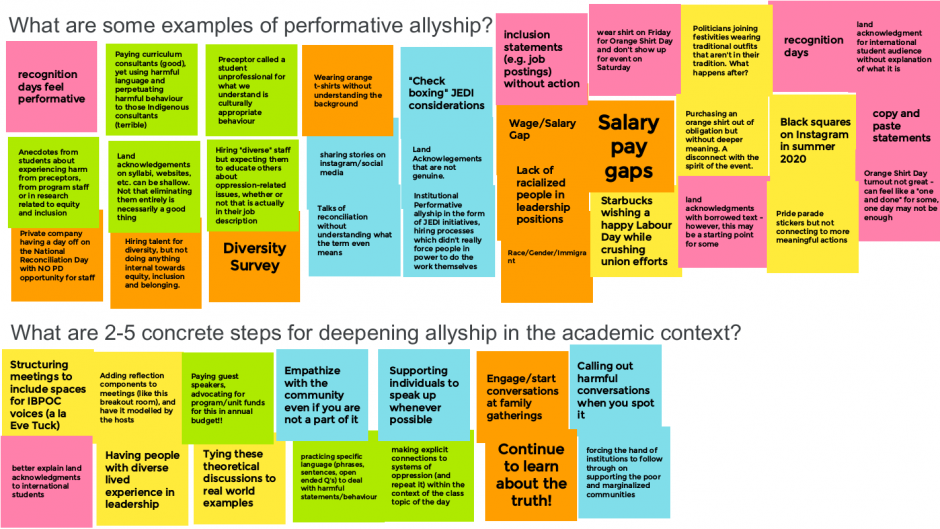Our next session will be held on Friday, December 16, 2022 at noon (PST). Stephanie Lim (Community Relations Coordinator, Faculty of Land & Food Systems) will lead the session this week.
The Lunch & Learn Series hosts a Justice, Equity, Diversity and Inclusion (JEDI)-based discussion session on the third Friday of each month. These sessions are led by Will Valley (Associate Dean, EDI at Faculty of Land and Food Systems) and the Learning Centre Team, and will be open to all. For these sessions, attendees will be provided with an article or podcast episode that will be explored in a reflective and interactive discussion.
What does it mean to be an ally? What is “performative allyship,” and why is it harmful? In this session, we will think about authentic and performative allyship. We will create space to discuss what allyship could look like in academic spaces, from facilitating Q&A periods, to identifying and navigating inequitable policies and procedures.
Join Stephanie, Will and the Learning Centre team this Friday to explore the best practices while being an ally. To register for the series, please visit https://ubc.zoom.us/meeting/register/u5cscumsqDwrG9OI5NHXco_FeqnmI0pzdWM1
Follow the Lunch & Learn Series on the Lunch & Learn Webpage!
Pre-Reading Resources for Discussion:
- Black lives don’t need performative allies | Déjà Rollins | TEDxUAMonticello
- Dr. Eve Tuck’s guidelines for academic Q&A
- https://theantioppressionnetwork.com/allyship/
Post-Event Resources:
Summary from the speaker:
In this session, we talked about allyship as an ongoing process of relationship-building, working in solidarity, and accountability. Allyship cannot be claimed as a static or self-designated identity. By contrast, displays of performative allyship are often highly visible (social media posts, high profile institutional policies, corporate branding) but they are shallow and lack engagement with complexity. These displays do not lead to more just or equitable conditions for people of marginalized identities as they navigate oppressive systems – they are usually window-dressing that makes the individual or institution look/feel better. In some scenarios, the creation of these displays (e.g. development process of a university anti-racism policy) perpetuates harm for those involved, and does not necessarily result in systemic change. Performative allyship is dangerous because it allows individuals and institutions to distance themselves from scrutiny or critique by claiming false or overstated commitments to equity and justice. This can delegitimate ongoing efforts to create real change within harmful systems (“we already have an anti-racism policy, so our work is done, there is no reason to complain”).
In small groups, participants generated examples of performative allyship within and beyond the academic context. Shallow land acknowledgements and surface engagement with Orange Shirt Day were mentioned a number of times. Participants were later invited to break into small groups to think about 2-5 specific “must-do’s” that would allow them to deepen authentic allyship in their specific work context, focusing on a tangible goal. The example given was Dr. Eve Tuck’s guidelines for facilitating less harmful Q&A discussions. Out of respect for confidentiality, ideas were only posted to the jamboard if participants felt comfortable sharing.
Notes:
“Allyship is not an identity—it is a lifelong process of building relationships based on trust, consistency, and accountability with marginalized individuals and/or groups of people.” -The Anti-Oppression Network
Jamboard:

Other Recommended Resources:
Allyship
- Performative Allyship Is Deadly (Here’s What to Do Instead)
- Performative Allyship: What Are The Signs And Why Leaders Get Exposed
- https://ariajourney.org/learn/allyship/
Mentioned in the session
- “Min Specs” activity (specify only the absolute “Must dos” and “Must not dos” for achieving a purpose)
- Sarah Ahmed (2004), Declarations of Whiteness: The Non-Performativity of Anti-Racism
- Sarah Ahmed (2006), The Nonperformativity of Antiracism
- A university chancellor apologized after mocking Asian languages in his speech
- Lido TV : Canada’s Top Land Acknowledgers